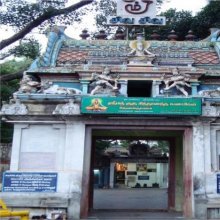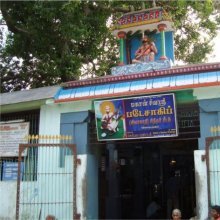Siddhananda, Siddhānanda: 3 definitions
Introduction:
Siddhananda means something in Hinduism, Sanskrit, the history of ancient India. If you want to know the exact meaning, history, etymology or English translation of this term then check out the descriptions on this page. Add your comment or reference to a book if you want to contribute to this summary article.
Images (photo gallery)
India history and geography
Source: DSpace at Pondicherry: Siddha Cult in Tamilnadu (historical)Swāmi Siddhānanda was born at Vaṇḍipāḷayam village, near Cuddalore. He lost his father in his young age and grown under the care of his mother, who engaged in the business of selling flowers and supplying garlands to the Pātalīśvara temple at Cuddalore. Every year on the death anniversary of Sāmi Siddhānanda, the Gurupūjā is celebrated in this Samādhi shrine with pomp and glory.

The history of India traces the identification of countries, villages, towns and other regions of India, as well as mythology, zoology, royal dynasties, rulers, tribes, local festivities and traditions and regional languages. Ancient India enjoyed religious freedom and encourages the path of Dharma, a concept common to Buddhism, Hinduism, and Jainism.
Languages of India and abroad
Sanskrit dictionary
Source: Cologne Digital Sanskrit Dictionaries: Aufrecht Catalogus Catalogorum1) Siddhānanda (सिद्धानन्द) as mentioned in Aufrecht’s Catalogus Catalogorum:—Bhuvaneśvarīdaṇḍaka.
2) Siddhānanda (सिद्धानन्द):—by Vijayānanda. Peters. 4, 17. Extr. 16 (Samāsaprakaraṇa).
Siddhānanda has the following synonyms: Kātantrottara.
3) Siddhānanda (सिद्धानन्द):—[grammatical] by Vijayānanda. See Kātantrottara.
Source: Cologne Digital Sanskrit Dictionaries: Monier-Williams Sanskrit-English DictionarySiddhānanda (सिद्धानन्द):—[from siddha > sidh] m. Name of an author, [Catalogue(s)]
Sanskrit, also spelled संस्कृतम् (saṃskṛtam), is an ancient language of India commonly seen as the grandmother of the Indo-European language family (even English!). Closely allied with Prakrit and Pali, Sanskrit is more exhaustive in both grammar and terms and has the most extensive collection of literature in the world, greatly surpassing its sister-languages Greek and Latin.
See also (Relevant definitions)
Full-text: Bhuvaneshvaridandaka, Vijayananda, Katantrottara.
Relevant text
No search results for Siddhananda, Siddhānanda; (plurals include: Siddhanandas, Siddhānandas) in any book or story.



